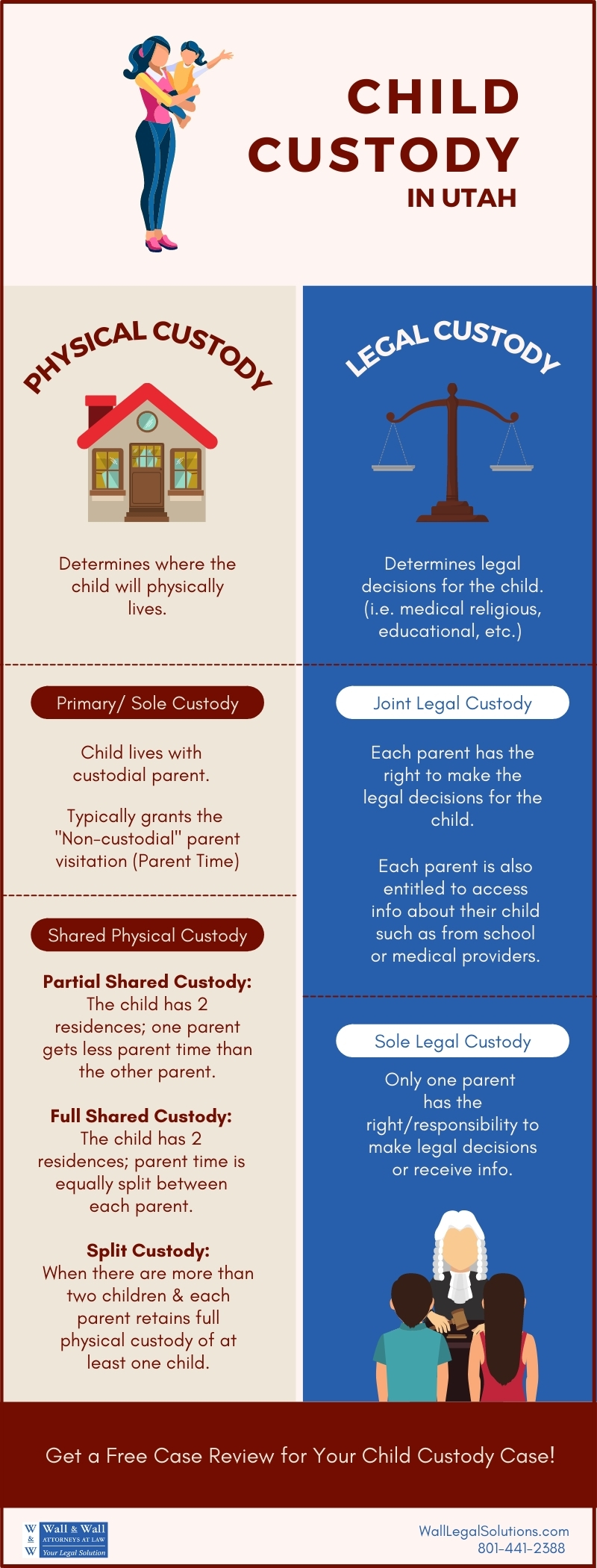Understanding Joint Physical and Joint Legal Custody
Also referred to as shared custody, joint custody is a court order arrangement in which both parents are awarded custody of their minor children. A joint custody arrangement places both parents in the role of the custodial parent such that there is no non-custodial parent. Legal arrangements for joint custody can become necessary following separation, divorce or any other cessation of cohabitation on the parents’ part, but joint custody is also possible if the parents never lived together in the first place. Our experienced attorneys at Wall & Wall Legal Solutions in Salt Lake City, Utah can help guide you through the decision making of sharing joint physical and joint legal custody.
What is Joint Legal Custody?
Joint legal custody gives both parents shared power to make decisions that affect their minor child. When there is a significant dispute between the parents, the court may intervene to resolve the issue.
What is Joint Physical Custody?
Children of parents who have joint physical custody split their living arrangements between both parents as according to an agreed-upon custody schedule.
What is a Joint Legal Custody Arrangement?
Under a typical joint custody arrangement, both parents have an equal right to legal and physical custody over their minor children. True joint custody requires that both parents have an equal part of the decision making a process for issues concerning their child’s welfare and upbringing as well as sharing the time devoted to the daily physical responsibility and care for their child.
No one-size-fits-all arrangement exists to dictate how the children will split their time between parents. Parents who share joint custody typically work out their own schedule between themselves, taking into consideration each parent’s work demands, housing situation and the children’s schooling and other needs. When parents are unable to agree to a schedule themselves, the court will step in to make arrangements to protect the children’s best interests. Many joint custody arrangements have the children alternate weeks with each parent, but a variety of other physical custody arrangements exist including:
- Alternating every two days between parents;
- Splitting the week equally between parents;
- Staying with one parent on weekdays and the other parent on weekends and holidays; or
- Alternating between parents’ homes over longer periods of time, from months to years.
Joint Legal Custody Takes Many Possible Forms
Joint custody arrangements can take many different forms depending on the schedules and abilities of each parent as well as the needs and interests of their children. As with many parenting arrangements within a marriage, often one parent will emerge as the primary caregiver, even if both parents share joint legal custody.
When one parent acts as the primary caregiver, they may make certain decisions on their child’s behalf that are covered by a joint legal custody agreement with the other parent’s implicit consent. For example, the primary caregiver parent could select a tutor for their child or take their child to the doctor for a routine physical. In such situations, the non-primary caregiver does have a legal right to take part in the decisions, but the parents have decided between themselves that this arrangement works better as a practical matter. Courts may sometimes give one parent the legal ability to make a final decision when both parents cannot agree in a joint legal custody arrangement.
Similarly, joint physical custody doesn’t need to include an exactly equal division of time, although it usually is close to 50-50. Joint physical custody typically works best when parents live close to each other so that their children can transition between houses without disruption of their regular activities. When parents have a contentious relationship, shared physical custody may not be best as the frequent transitions can give rise to conflict.
Frequently Asked Questions About Joint Custody in Utah
Your likelihood to get joint custody in Utah depends on a few factors. The terms of parental visitations depend on the best interest of your child. Before granting joint custody, the court will consider the ability of the parents to make decisions together and work together in favor of their children’s interests. Joint custody is granted if both parents have played a role in raising their children before the divorce. They will consider the physical, emotional, and psychological needs of the children.
Even though you don’t always need a lawyer when filing for joint custody, getting a lawyer is a good idea. The benefits of a good lawyer are endless. A professional and experienced custody lawyer can help you anticipate future issues. They can help you come up with strong arguments in your favor. Their confidence in courtroom procedures and negotiation skills can be helpful.
In a joint custody agreement, both parents have the same physical and legal custody over their underage children. If you don’t believe that it is the best option for your children, you don’t have to agree to it. You can work with an attorney to contest it.
Fathers can and do get joint custody if they deserve it. In most cases, courts prefer that both parents share custody. Courts in Utah and all parts of the United States do not have the right to show bias against fathers. If you prove that you are a good parent, you can get joint custody. Some of the most critical factors that the court may consider include paternity, your relationship with the child, and the mother’s relationship with the child.
Joint custody may be the best option for a child, depending on the circumstances. It is a great option when:
- Both parents agree that it is in the best interest of the child.
- The parents have no history of domestic violence, child abuse, or negligence
- The parents can work together to make decisions that are reasonable and appropriate for their children.
- The geographical distance between the parents makes it possible to have a joint agreement.
- Both parents wish to be involved in their child’s lives.
-
With joint custody, child support payments can be a bit complicated. In Utah, both parents must be financially responsible for their children. The amount they pay in joint custody child support depends on the custody arrangement, their income, and the number of children they are raising. Joint custody may reduce child support, but it isn’t always the case. If you believe that you may not be receiving enough support, you can challenge the amount in court. The right lawyer can help you get enough child support.
Joint custody can affect your benefits. You and your spouse cannot both receive benefits for the same children. The benefits may go to the parent who offers most of the day-to-day care to their children.
Have Your Proposed Custody Arrangements Reviewed By Our Experienced Family Law Attorneys at Wall & Wall Legal Solutions
At Wall & Wall Legal Solutions, our team of skilled attorneys can help you secure the best child custody arrangement. Contact Wall & Wall Legal Solutions today to schedule a free legal review of your proposed custody arrangement or call us at (801) 441-2388


